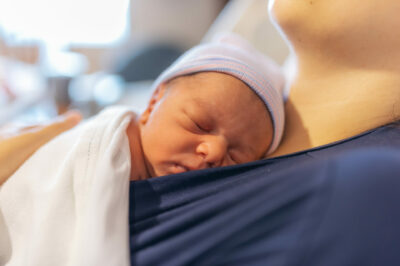Sex After Baby. Everything You Need to Know.
Sex after baby is different–at least for awhile. Here’s what you should know about having sex after baby.
Some new moms want to get back into action soon after the delivery–for others it takes a long time to regain their energy and sex drive. There is no specific time you ‘should’ be back to your former sex life.
In fact, your sex life after baby life is likely to look different than your adventures before baby. Much of the difference will depend on how quickly you want to start and how your roles as new parents are going for you both.
When Can We Have Sex After Baby Arrives?
You can do sexy things as soon as you feel up to it, but it will likely be awhile due to soreness, bruising and/or stitches.
In the early weeks after baby, you will likely be struggling with a low libido (sexual desire); plus, hormonal changes (declining progesterone and estrogen levels) and work of caring for a baby are likely to tire you out and leave less room for lovemaking.
If you are in the mood, though, go for it! There are plenty of fun things to do without bothering your sore parts if you’re not ready for that.
It is commonly suggested to wait until your six-week postpartum checkup to be given the green light to have sex after baby but this is largely arbitrary. According to the American College of Obstetricians and Gynecologists (ACOG), there is no “set waiting period” to have sex after baby.
ACOG states that your “chances of a problem occurring, like bleeding or infection, are small after about 2 weeks following birth.” That said, it is likely perfectly safe to have intercourse as soon as your stitches heal, your lochia bleeding is low, and you’re in the mood for it.
How Do We Do Postpartum Sex?
Everything besides intercourse is the same as you’ve always liked it. You may feel more sexy or less sexy after having a baby. Some people feel stronger, more confident, and fulfilled in their reproductive success! Some feel worn down and damaged. Your experience of birth–especially how you were treated by the medical staff–can play into this.
Know that your feelings toward sex may have changed a bit, for better or worse, and that it is normal. Whatever you do in bed, do it slowly and lovingly for awhile. Talk with your partner about how you are feeling, including your thoughts about sex.
Intercourse (or anything in the vagina) will feel different at first. If your perineum is still sore, it’s probably too soon. If you’re all healed up, it will still require gentleness.
You will also probably need a considerable amount of over-the-counter personal lubricant due to the vaginal dryness you may be experiencing. Try different positions, go slow, and be open with your partner about what feels good.
Does Vaginal Delivery Affect My Sex Life?
Any kind of birth will affect your sex life for awhile. No one wants to have sex days after they have a baby, whether they had a vaginal delivery or a c-section delivery.
During the postpartum period, your body is healing. If you had a c-section, you have more serious healing to do. If you had a vaginal delivery, you’re likely feeling bruised, sore, or tender.
For either kind of delivery, your postpartum healing includes strengthening and toning your pelvic floor muscles. These muscles hold in your abdominal organs, especially your uterus and vagina.
The pressure of pregnancy can take its toll on your pelvic floor. See a physical therapist who specializes in the pelvis to get help avoiding the greater problems associated with weak pelvic muscles.
Intercourse after vaginal delivery will feel different, probably for both of you. Once you’re completely healed, it’s just a matter of time before you’re back to your ‘normal sex life.’
Learning to do kegel exercises correctly at the physical therapist will help improve muscle tone and keep everything in place.
Sometimes I Pee Myself Now. Do My Pelvic Floor Muscles Impact Post-Baby Sex Life?
One of the problems with weak pelvic muscle tone postpartum is the difficulty holding your urine. You’ve probably heard your mom or aunt or grandmother joke about peeing a little when they laugh or jump on a trampoline.
It doesn’t have to be this way. See a pelvic physical therapist who will help you strengthen and control those muscles. She can also inform you if further measures are necessary.
Strong pelvic muscles (in men and women) leads to better orgasms and more sexual control, A+ continence, and organs that stay where they belong–so it’s nothing to shake a stick at.
What are My Birth Control Options for Postpartum Sex?
The likelihood of pregnancy in the weeks postpartum is very small, but some bodies do become fertile again quickly. Keep in mind that even if you haven’t had your period yet, you do become fertile before you have your first period!
Early on, before your postpartum checkup (usually at around six weeks), you can use a condom with some lubricant and spermicide.
Once you’re ready for something else or something more permanent, see your midwife about your options, which are typically the same as your options before baby. If your provider discouraged or disallowed an IUD before pregnancy, that becomes an option for you. Many women do choose an IUD for postpartum birth control.
Does it Really Take Some People Six Months to Start Having Sex Again?
Rarely. In cases where there was severe tearing, healing can take up to six months.
Severe tears such as this are rare, and typically only happen if you are birthing on your back, with an epidural, an episiotomy, and/or numbing meds on your perineum. It’s more likely if you are pushing without being able to feel or someone is yelling and counting your pushes.
Why is My Sex Drive so Low With a New Baby?
Your body has just done the most draining thing a body does in the life cycle–make and birth a baby. Now you are parenting that baby, which is also draining, both physically and emotionally. Your body is not stupid. Now is a very bad time to get pregnant.
The hormonal changes associated with delivery and breastfeeding are there, in part, to help you not get pregnant again. This is accomplished in part by assuring you that it’s quite alright if you don’t want to have sex after baby. “In fact,” says your body, “that’s a good idea. Let’s just not have sex and not risk it.”
Even if your hormones are running the “yay, sex!” program, your mind may not be. This is also normal. Your thinking brain will tell you that sex is not a priority when you have so much going on in your new roles as parents.
If you’re having difficulty with anxiety or depression (which could be postpartum depression) reach out to your healthcare provider. Your libido may come back along with your calm.
Tips For the Dads
If you feel ready to be sexual with her again, it’s the same as it ever was — you have to take care of her first and pay attention to her needs, then she’ll be in the mood.
First we heal. If you had stitches in your penis you wouldn’t be interested in anything remotely titillating either. Allowing her to rest by taking care of household needs, bringing her drinks and snacks, encouragement, and cuddling are where it’s at.
Next, we come up for air. After that ordeal, we need to catch our breath. Keep being helpful and loving. Wait for her to initiate, or just do slow sensual massage to encourage her.
Then, we hit a stride. Once the bleeding stops, the baby can breastfeed well, and the bottom is healed, we feel more confident about this gig. This is a good time to start asking for what you want but without a lot of pressure. Keep up the loving care and tell her she’s beautiful and sexy and soon she’ll ask for it herself.
Finally, we feel kind of normal. Regular sex should resume along with ‘regular life.’ If it doesn’t, ask her about how she’s feeling and if she needs help with baby or mood or other duties. Is she getting enough sleep for her body to want to have sex? In most cases, you don’t need a sex therapist, you just need to give it some time.
Remember: Try non-intercourse things first, do a lot of foreplay, and be sensitive to her needs. Go slow and use lots of personal lubricants when you decide to resume intercourse.
Disclaimer: Pregnancy by Design’s information is not a substitute for professional medical advice or treatment. Always ask your health care provider about any concerns you may have.
Cited Research:
Simkin, Whalley, and Keppler. Pregnancy, Childbirth, and the Newborn (2001). Meadowbrook Press.



 Gestational Diabetes During Pregnancy
Gestational Diabetes During Pregnancy






Leave a Reply